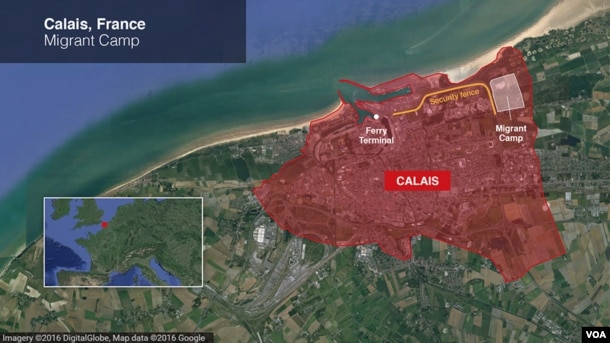
Fate of Children in Doubt as Calais Camp Demolition Begins
VOA News
Salem Solomon
The demolition of the camp that came to symbolize Europe’s refugee crisis is underway in Calais, France. Commonly known as “the jungle,” the camp has been home to an estimated 6,500 people, according to the French government, including 1,200 unaccompanied and separated children.
Some of those children are now being offered the chance to relocate to Britain. Nearly 200 will make the journey there including 150 who will be reunited with families already living there, Celine Schmitt, spokeswoman for the United Nation’s refugee agency (UNHCR), told VOA.
“This year, what we have seen has been an increase of unaccompanied children arriving in Europe mainly in Italy,” she said. “They arrive by boat in Italy and they continue their way on foot and so many of them end up in Calais. They are very often used by or abused by smugglers and they are arriving in Calais, sometimes with the dream to go to Britain and they need protection and need to go to a safe place.”

Care, protection lacking
Lliana Bird, the co-founder of Help Refugees, a non-profit organization working with refugees in Calais, said that the French government wasn’t providing care and proper child protection.
She added that the children in the camp have been through unimaginable ordeals. The children were “running from some horror, whether it’s terrorism, whether it’s war, whether it’s being recruited by some extremist group, whether extreme poverty, they all have a different reason,” she said.
Since making the announcement about plans to close the camp this year, French president, Francois Hollande has called on British authorities to “play their part in the humanitarian effort that France is carrying out.”
He said that Britain’s vote to leave the European Union (EU) does not change its responsibilities toward the continent. “The U.K. has taken a sovereign decision, it does not mean that it has absolved itself of its responsibilities toward France. Quite the opposite,” Hollande said.
Children most vulnerable
Rosa Curling, a human rights lawyer at Leigh Day, a British law firm acting on behalf of Help Refugees said that “there are children in Calais to whom the government owes a duty and who are at imminent risk of serious harm if adequate steps are not taken to protect them during the eviction and demolition.”
Most of the migrants and refugees who lived in the camp aspire to go to Britain but priority has been granted to the most vulnerable children.
On October 21, the British High Court began judicial review of what is called the Dubs Amendment, a section of the country’s Immigration Act enacted this year which calls on the country to support and relocate unaccompanied minor refugees from Europe to Britain. The amendment is named for Lord Alfred Dubs, a British politician and former child refugee who fled the Nazi invasion of Czechoslovakia in World War II.
Dubs Amendment
Advocacy groups are charging that the Britain is not moving swiftly enough to fulfill its obligations under the Dubs Amendment. “We are saying that the Dubs Amendment is an important new duty and it must be implemented urgently,” Curling said.
Lliana Bird of Help Refugees said despite the Dubs Amendment passing in May, the British government has only recently taken action. “As the Calais demolition loomed and we counted in all our census over a thousand unaccompanied children, we realized that something needed to happen,” she told VOA.
There are two ways for unaccompanied children to legally secure entry into Britain. One is through what is known as Dublin III, a process in which children are eligible to reunite with their families. The other group are those who don’t have family and that’s where the Dubs Amendment applies.
The demolition process of the camp is expected to be completed by the end of this week.

